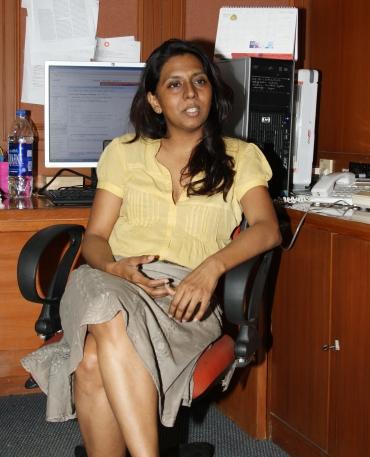
Senior journalist and Mumbai Mirror Editor Meenal Baghel's debut novel Death in Mumbai chronicles the chain of events that led to the brutal killing of young TV channel executive Neeraj Grover and the meticulous investigation that uncovered the murder and its gory cover-up.
In a live chat with readers of Rediff.com, Baghel answered a variety of questions on what prompted her to choose this particular subject, her interactions with the protagonists and the trauma of their families:
Kush: Do you think crime and violence are the easiest things to cater to readers?
Not necessarily so, though readers' interest in these subjects may be higher.
Rajesh: Would you say as a woman, it was a little easier to reach out to Maria?
I wouldn't think so. I think Maria spoke to me because she saw that I was interested in her story and that I was persistent.
Truth: Did Maria serve a lesser sentence in jail? How was your experience with the Mumbai police while retrieving information from them?
If we believe in the legal process, which I do, we have to go by the court verdict. You may be aware that all three parties -- the prosecution and Maria and Emile -- have appealed the decision in the higher court and it will be interesting to see the outcome.
Kirti: Of the three main characters in your book, which one did you find most interesting as a person?
I think Maria was the most fascinating. She is a complex woman who is quite smart, ambitious and at the same time she seemed vulnerable and stupid in her choices.
Truth: What was your experience with the Mumbai police while retrieving Fact Sheets from them?
Initially, most of the cops were reluctant to talk and obviously they wanted to present their version of the events. But eventually they were very helpful, particularly Rakesh Maria and the investigating officer in the case.
Po: Being editor-in-chief of Mumbai Mirror, did it makes things easy for you?
Yes, in so far as getting appointments were concerned, but beyond that the paper and the book were two different things.
Sonu: Ever so often, the subject and the journalist forge a bond. Did that happen to you too?
Not really, because the of the three people I was writing about, one was dead and two were in jail. It was not easy meeting Maria and Emile.
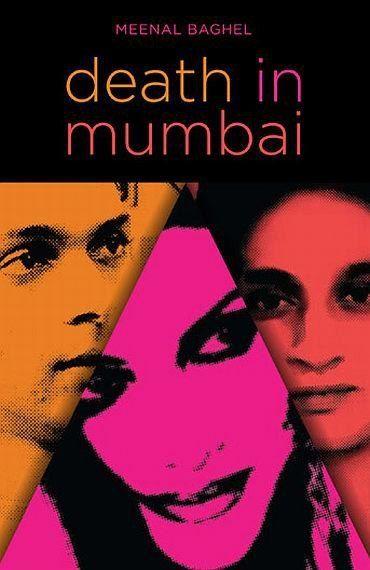
Sanjay: Maria and Emile, do they even regret what they did, how brutally and inhumanly they did that?
I can't say because both of them have contested the guilty verdict so evidently there seems to be no admission of guilt
Truth: In the title Death in Mumbai, why Mumbai? This case can happen anywhere in the world. Any specific reason to involve Mumbai's name?
Specifically Mumbai because the television industry is located in Mumbai. In fact the book is much more than just about the killing. It is a story of several conflicts. Between modernity and traditional values, between parents and children and how Mumbai can change people from small towns.
Yamaha: What was the first thing that came to your mind when you met Maria Susairaj? Could you describe your first meeting with her for us please?
I always met Maria in court. When the trial began she appeared posed, sophisticated and was always exceptionally well-dressed. She was very soft spoken.
Rahul: I am intrigued about Maria and how crime and prison changed her life. What sense did you get about this after meeting her? Was there trepidation about how she would face the world after she got back home?
The sense I got after meeting her was that she just wants to hunker down and rebuild her life.
Hero: How much would you say the surge in the non-fiction genre in the West has to contribute to this (for the lack of another word) movement?
I just think there is a greater sense of confidence among Indian writers to tackle all kinds of stories, including non-fiction, as also the realisation that there is a growing market for these stories.
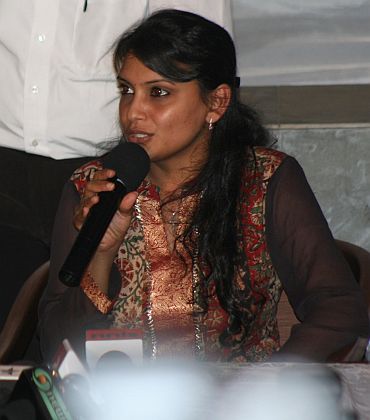
Princess: I have just started reading your book and couldn't help wonder, did you ever feel a sense of self-revulsion that you were digging into too private a part of people's lives?
Self-revulsion is a strong word.
Minu: What would you say were the greatest challenges in trying to get through the red tape?
There was no red tape. The challenge was in trying to get people to open up about their lives. People like Neeraj's parents were going through a difficult time and talking to them, forcing them to relive memories was tough.
George: Do you see any parallel between Jigna Vora and Maria Susairaj? Are both culpable or victims of their ambitions?
The main difference between Jigna and Maria is that Maria has been convicted. We have no proof of Jigna's guilt so far.
Duttoo: There's sympathy, even empathy for Emile and Maria in your book. Did that happen after you met them, a kind of Stockholm syndrome?
There's empathy, yes, but no sympathy. Meeting these people gave me a better sense of who they are but neither would become a friend.
Sanjay: So what were they thinking while talking to you -- to act innocent so that you can spread a good word for their character or was it just their way of redemption?
I don't know what they were thinking, but the sense I got was that they too wanted to tell their side of the story
Princess: Sorry, my question was not meant to offend you and if it did I am sorry. But tell me, considering the ruthlessness of the crime, do you think men and women have this beast hidden in them that comes out due to some severe provocation? I mean, can you imagine chopping someone up, and then making love right next to the cut pieces, blood and all! What next, necrophilia?
I am not offended -- but I think what happened is an exception rather than the rule. In the course of researching this book, I spoke to many people with an exceptionally high sense of entitlement. That can be a worrying phenomenon in an increasingly competitive environment.
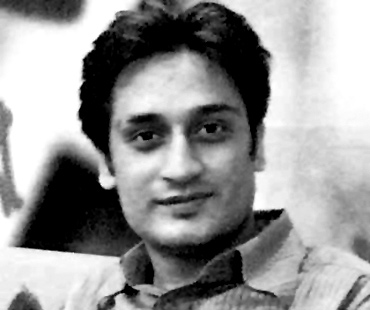
Xylo: Do you think there are many Marias in our society?
The striking thing about Maria was that when I spoke to her she just seemed like the girl-next-door.
Nirmal: Tell us about the Grover family who lived far away from Mumbai and were faced by this horrible tragedy?
I spent a traumatic day with the Grovers in Kanpur. Their loss is unimaginable and irreplaceable. They had no idea that their son was seeing Maria and they have been left completely shattered by the killing. That it happened in such a grisly manner -- and that they did not get to conduct his last rites -- has added to their pain
Tintin: Do you think of Neeraj Grover? If you happen to meet him, what will you tell him? Why did he have to die?
He should have never died. He was a regular young man who had committed no wrong.
Akash: Who are your favourites writers? What are some of the debut novels that you have liked?
JM Coetzee and Michael Ondtaaje are two favourites.
Princess: Why do you think crime reporting in Mumbai (probably elsewhere too) has degenerated into reporting police bulletins? Is it because of the reporters, or because of the editors who don't think crime is big news vis-a-vis say Bollywood?
I wouldn't agree entirely but yes, there needs to be greater questioning of the police version of events.
Baiju: You mentioned that Maria seemed like a girl next door? What did you think were her concerns, her aspirations?
She is very close to her family, she definitely wanted to get married and she was also very ambitious in that she somehow wanted to become famous.
Leena: Do you see yourself identifying with any of your characters?
No, I don't thankfully :-)
Shruti: What kind of LOVE was between Maria and Mathew?
I think Maria really cared for him and wanted to get married to him but his family was not giving their permission.
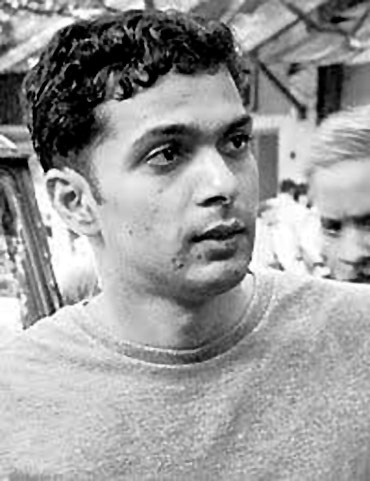
Max6: Which are your favorite crime novels?
Elmore Leonard, Truman Capote are my favourite crime writers.
Hitesh: What were your views on RGV's film on the subject?
I don't think RGV was really interested in either Neeraj or Emile.
Gravity: I have not yet read your book, but judging by what you said, what is so fascinating about Maria Susairaj? Should woman offenders get a lighter sentence and what is your stand on capital punishment to women?
I don't think courts should make distinctions on the basis of gender
Sonal: Did Ram Gopal Verma approach you when he made a movie based on this murder?
No, he did not. But I spoke to him at length and he is a chapter in the book.
Naresh: Do you think Neeraj was immoral?
No, I don't think so.
Meenakshi: What do you think will become of Emile? His future?
He has appealed against his conviction in the high court. It would be interesting to see what happens there. But his career in the Navy is over.
Meenakshi: Who are your favourite Indian writers?
Vikram Seth, Altaf Tyrewalla and Namita Devidayal.
Sinha: Which was the most difficult part of the story to narrate for your readers?
I think recreating the killing in the book was the toughest part
Alok: How did you find time to write this book? You are an editor so give us some advice about time management. How is it possible?
I took some leave to do the research and would mostly write at night.
Thank you guys for your questions. I hope you will read the book -- it will have the answers to most of your questions. Bye.